More Poor Richard, Part 3
by Dr. Mark David Major, AICP, CNU-A, The Outlaw Urbanist contributor
Courteous Reader,
I attempted to win your favor when I wrote my first Almanac for Architects and Planners, in the name of the public good and professional betterment, by way of earning some profit and a wife. I am gratified by your expression of encouragement for my tireless efforts dedicated to these aims. Alas, my circumstances still find me exceedingly poor and, unluckily, exceedingly wifeless. I am required to earn some profit to address both problems whilst now addressing a third, namely testing the proposition that insanity is “doing the same thing over and over again and expecting different results.” To satisfy my own particular brand of insanity, I have written more proverbs and whimsical sayings for your benefit and, hopefully, my own.
As before on The Outlaw Urbanist, I write this new Almanac in increments of ten, according to the dictates of Moses and the Almighty. However, once published as an Almanac for Architects and Planners, the proverbs and witticisms were gathered into a number equal to the days of the week, after being reliably informed that both seven and ten are sacred numbers. My desired requirement for a wife is sufficient motive to write this new Almanac in the hope it will find your favor and retweets as a means of demonstrating the usefulness of my continued efforts but also your charity to this sane Friend and poor Servant,
Richard
On Creating and Creativity
21. Planners with 20/20 foresight are more valuable than those with 20/20 hindsight.
22. Organisms are machines for living. When it comes to creating machines, Nature is still infinitely superior to Man.
23. Man assumes a God-like artifice compared to the machines he creates but, compared to the Nature of the Universe, Man is an ant.
24. A little humility before Nature goes a long way.
25. Creativity is a newly (re)discovered path that is often more important than the destination itself.
26. Creativity and space flow with an energy born from the same source.
27. For any true artist, a blank page is exciting and frightening in equal measure.
28. Creativity is the vibrant symbiosis of courage to succeed and fear of failure. Too often, urban planners suffer from an abundance of the latter and deficiency in the former.
29. Shame on the architect who does not design with love and builds that which is unloved by its own creator.
30. For an architect or planner, doubt only marks the beginning of a path to wisdom. Doubt only marks hubris if it is treated as a destination unto itself. Take the path and never assume you have arrived.
Issue 4 of More Poor Richard for Architects and Planners cometh soon!

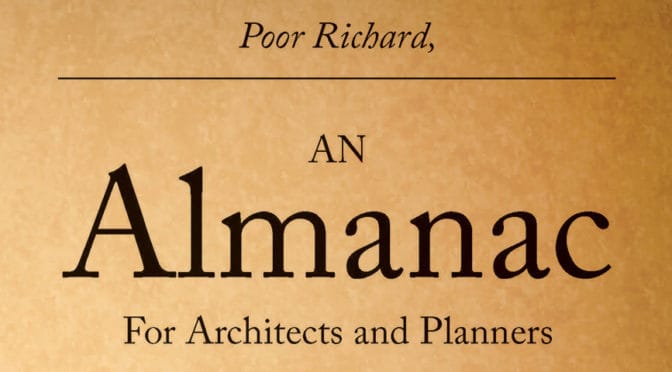

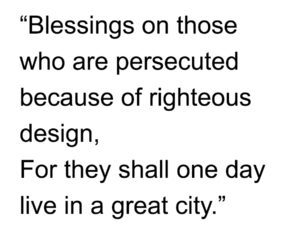 Blessings on the placemakers,
Blessings on the placemakers,
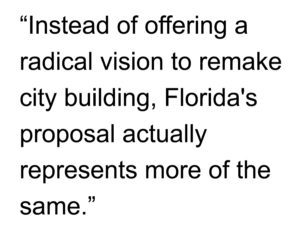 The circus of Senate confirmation hearings for the Secretary of Cities, brought to you by National Ready Mixed Concrete Association and Community Organizations International, just as soon as the Senator from Montana releases his hold on the nomination! Stay tuned! More pigs feeding at the Federal trough would inevitably populate Florida’s Department of Cities. That is fine for the pigs but what about the rest of us?
The circus of Senate confirmation hearings for the Secretary of Cities, brought to you by National Ready Mixed Concrete Association and Community Organizations International, just as soon as the Senator from Montana releases his hold on the nomination! Stay tuned! More pigs feeding at the Federal trough would inevitably populate Florida’s Department of Cities. That is fine for the pigs but what about the rest of us?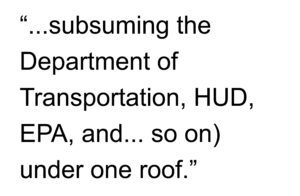 The only way a Federal Department of Cities could alter the prevailing development paradigm in this country for the last century is if we are willing to place Smart Growth for our cities at the top of the agenda by subsuming the Department of Transportation, Department of Housing and Urban Development, Environmental Protection Agency, and other disparate Federal agencies and offices (Office of Urban Affairs, and so on) under one roof. Incidentally, this is probably the only way a new Department of Cities could generate bipartisan support by allowing the left and the right to explicitly address their key constituencies (urban interests on one hand, reducing and streamlining government on the other). It would also require both parties adopting an united front to take on other special interests threatened by such reform (most obviously, radical environmentalists). In the absence of such radical thinking, our cities are safer as “laboratories for pragmatic bipartisan policy innovation, pioneering new approaches on everything from schools, crime and gun control to economic development” at the local and State level.
The only way a Federal Department of Cities could alter the prevailing development paradigm in this country for the last century is if we are willing to place Smart Growth for our cities at the top of the agenda by subsuming the Department of Transportation, Department of Housing and Urban Development, Environmental Protection Agency, and other disparate Federal agencies and offices (Office of Urban Affairs, and so on) under one roof. Incidentally, this is probably the only way a new Department of Cities could generate bipartisan support by allowing the left and the right to explicitly address their key constituencies (urban interests on one hand, reducing and streamlining government on the other). It would also require both parties adopting an united front to take on other special interests threatened by such reform (most obviously, radical environmentalists). In the absence of such radical thinking, our cities are safer as “laboratories for pragmatic bipartisan policy innovation, pioneering new approaches on everything from schools, crime and gun control to economic development” at the local and State level.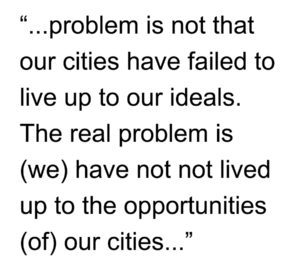 Why would we expect our citizens (and their representatives) to ever trust us and put us in charge when we have demonstratively failed our cities time and time again during their lifetime, their parents’ lifetime, and their grandparents’ lifetime? Instead of searching for magic bullets (like Florida’s idea), let us dedicate ourselves to leading for our cities. The irony is, if we truly did this, we would probably find the perceived need for Florida’s proposal and others like them would disappear. Unless, of course, the point is to become one of the fattest pigs at the trough. If this is the case, then never mind…
Why would we expect our citizens (and their representatives) to ever trust us and put us in charge when we have demonstratively failed our cities time and time again during their lifetime, their parents’ lifetime, and their grandparents’ lifetime? Instead of searching for magic bullets (like Florida’s idea), let us dedicate ourselves to leading for our cities. The irony is, if we truly did this, we would probably find the perceived need for Florida’s proposal and others like them would disappear. Unless, of course, the point is to become one of the fattest pigs at the trough. If this is the case, then never mind…